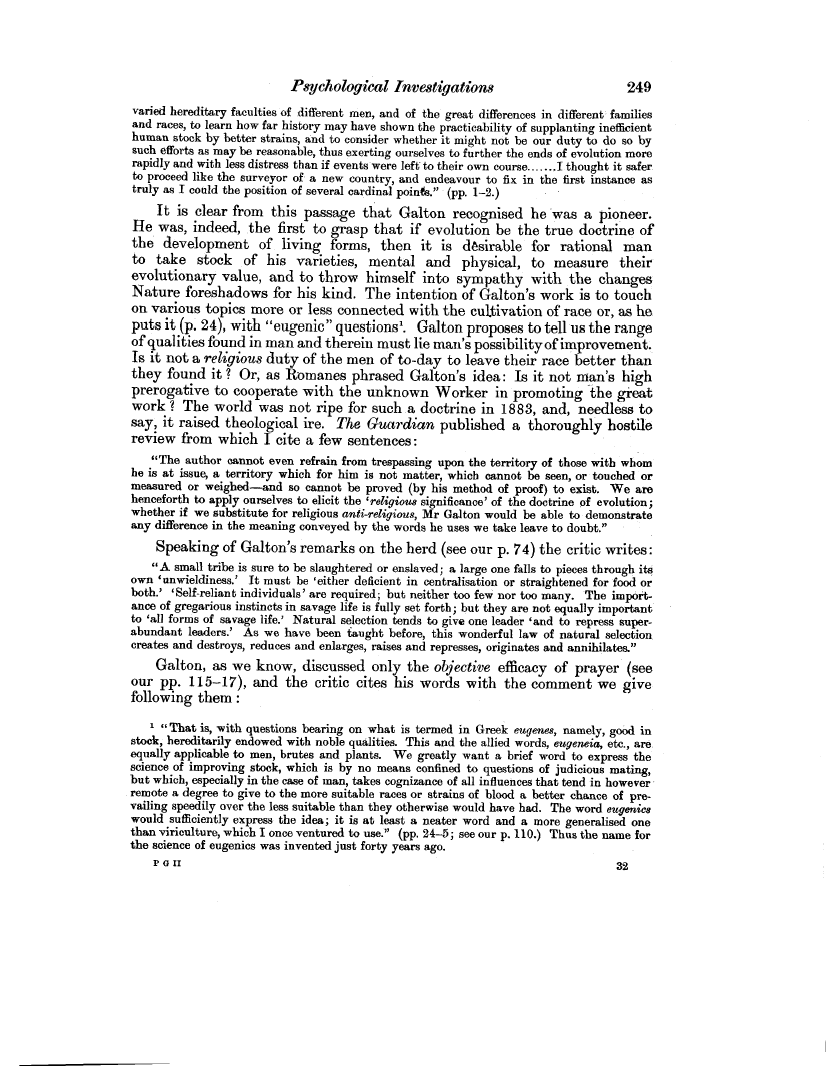Psychological Investigations 249
varied hereditary faculties of different men, and of the great differences in different families and races, to learn how far history may have shown the practicability of supplanting inefficient human stock by better strains, and to consider whether it might not be our duty to do so by such efforts as may be reasonable, thus exerting ourselves to further the ends of evolution more rapidly and with less distress than if events were left to their own course I thought it safer to proceed like the surveyor of a new country, and endeavour to fix in the first instance as truly as I could the position of several cardinal points." (pp. 1-2.)
It is clear from this passage that Galton recognised he 'was a pioneer. He was, indeed, the first to grasp that if evolution be the true doctrine of the development of living forms, then it is desirable for rational man to take stock of his varieties, mental and physical, to measure their evolutionary value, and to throw himself into sympathy with the changes Nature foreshadows for his kind. The intention of Galton's work is to touch on various topics more or less connected with the cultivation of race or, as he puts it (p. 24), with "eugenic" questions'. Galton proposes to tell us the range of qualities found in man and therein must lie man's possibility of improvement. Is it not a religious duty of the men of to-day to leave their race better than they found it? Or, as Romanes phrased Galton's idea: Is it not man's high prerogative to cooperate with the unknown Worker in promoting the great work? The world was not ripe for such a doctrine in 1883, and, needless to say, it raised theological ire. The Guardian published a thoroughly hostile review from which I cite a few sentences
"The author cannot even refrain from trespassing upon the territory of those with whom he is at issue, a territory which for him is not matter, which cannot be seen, or touched or measured or weighed-and so cannot be proved (by his method of proof) to exist. We are henceforth to apply ourselves to elicit the `religious significance' of the doctrine of evolution; whether if we substitute for religious anti-religious, Mr Galton would be able to demonstrate any difference in the meaning conveyed by the words he uses we take leave to doubt."
Speaking of Galton's remarks on the herd (see our p. 74) the critic writes:
"A small tribe is sure to be slaughtered or enslaved; a large one falls to pieces through its own 'unwieldiness.' It must be `either deficient in centralisation or straightened for food or both.' 'Self-reliant individuals' are required; but neither too few nor too many. The importance of gregarious instincts in savage life is fully set forth; but they are not equally important to 'all forms of savage life.' Natural selection tends to give one leader 'and to repress superabundant leaders.' As we have been taught before, this wonderful law of natural selection, creates and destroys, reduces and enlarges, raises and represses, originates and annihilates."
Galton, as we know, discussed only the objective efficacy of prayer (see our pp. 115-17), and the critic cites his words with the comment we give following them
1 "That is, with questions bearing on what is termed in Greek eugenes, namely, good in stock, hereditarily endowed with noble qualities. This and the allied words, eugeneia, etc., are, equally applicable to men, brutes and plants. We greatly want a brief word to express the science of improving stock, which is by no means confined to questions of judicious mating, but which, especially in the case of man, takes cognizance of all influences that tend in however remote a degree to give to the more suitable races or strains of blood a better chance of prevailing speedily over the less suitable than they otherwise would have had. The word eugenics would sufficiently express the idea; it is at least a neater word and a more generalised one than viriculture, which I once ventured to use." (pp. 24-5; see our p. 110.) Thus the name for the science of eugenics was invented just forty years ago.
PaII 32

